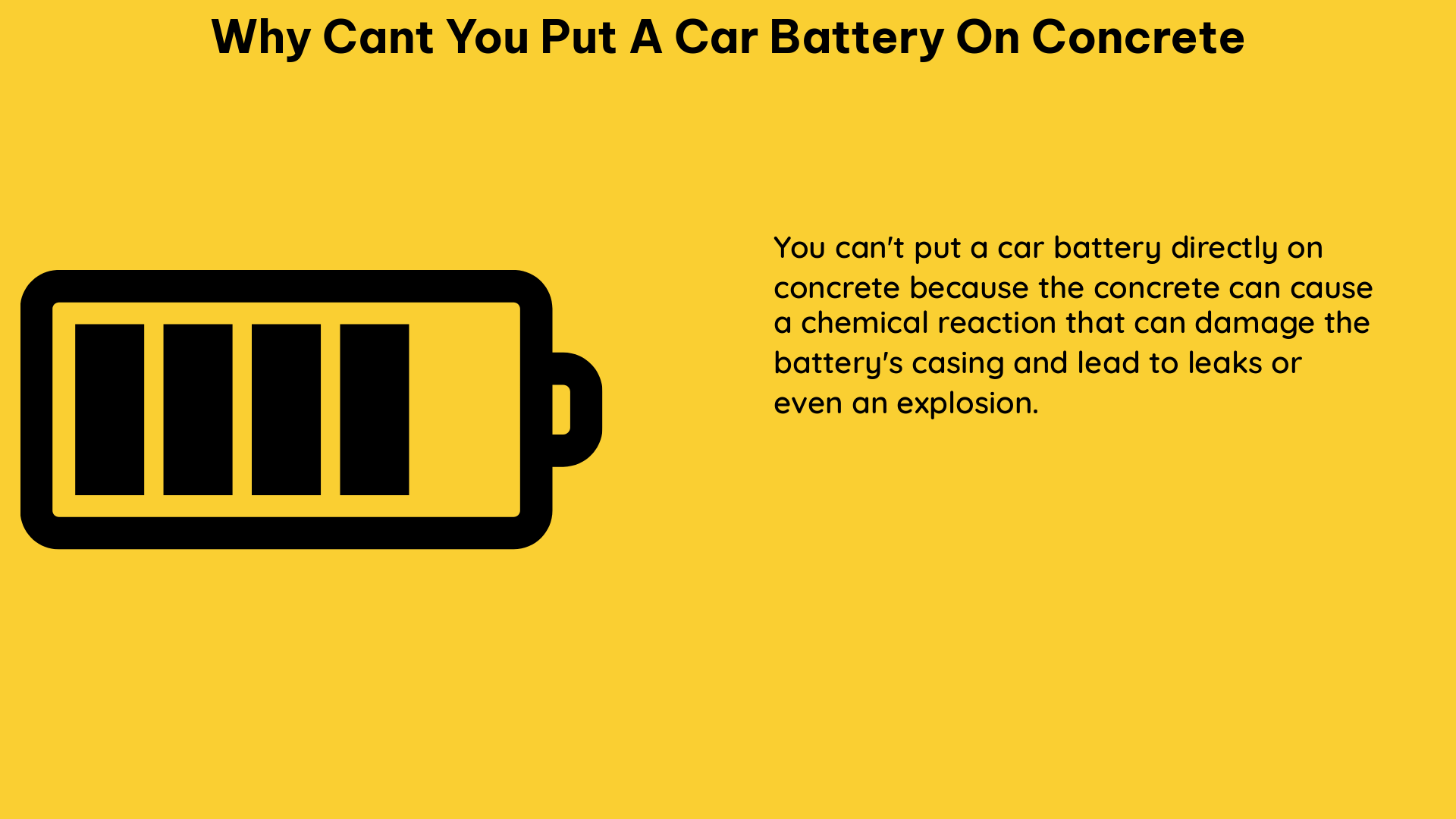The belief that you cannot put a car battery on concrete is a myth that stems from outdated circumstances. While modern car batteries have plastic-encased casings that are not affected by moisture from concrete, there are still valid reasons why it might be a good idea to avoid storing a car battery directly on concrete.
Understanding the Myth and the Modern Reality
In the past, battery casings were made from porous materials like tarred wood or rubber, which were susceptible to degrading after exposure to moisture from unsealed concrete. This degradation could cause battery acid to leak out and water to enter the battery, reducing its capacity. However, today’s car batteries have plastic-encased casings that are not affected by moisture in the same way.
The Impact of Cold Concrete Floors

One of the primary reasons why it might be a good idea to avoid storing a car battery directly on concrete is the potential for slower chemical reactivity in the cells due to cold temperatures. Concrete floors can be exceptionally cold in winter, which can result in lower battery output voltage. This means that a battery could be reading as empty when it still holds a substantial charge inside, which could be problematic during winter when battery systems are used the most due to lower light conditions.
Measuring the Impact of Cold Temperatures
Car batteries are labeled with CCA (cold cranking amps), a measurement of how many amps a battery can output at given temperatures. More expensive batteries will have better CCA, meaning they can maintain higher output voltages in colder conditions. For example, a standard car battery might have a CCA rating of 500 amps, while a premium battery could have a CCA rating of 800 amps or more.
Potential for Leakage and Improper Handling
Another concern with storing a car battery directly on concrete is the risk of improper handling causing leakage. While modern batteries do not leak as much as some people might think, any leakage of the electrolyte would mean a defective battery and would have to be tossed anyway, instead of stored.
Understanding Battery Venting and Leakage
All car batteries vent hydrogen gas during use or temperature increases, but the sulfuric acid is designed to stay contained. Leakage occurs primarily from improper handling of a battery, such as tipping it or knocking it around. Proper care and handling are essential to prevent any potential leakage.
The Chemical Reaction Behind Battery Performance
It is also worth noting that batteries create electricity by means of a chemical reaction, so changes in temperature are going to have effects on that reaction. The primary one being the cold, which is why car batteries are labeled with CCA (cold cranking amps), a measurement of how many amps a battery can output at given temperatures.
Factors Affecting Battery Chemical Reactivity
The chemical reactivity within a car battery is influenced by several factors, including temperature, electrolyte concentration, and the condition of the battery’s internal components. Colder temperatures can slow down the chemical reactions, leading to reduced output voltage and capacity.
Recommendations for Storing Car Batteries on Concrete
If you must store a car battery on concrete, there are a few steps you can take to mitigate the potential issues:
- Insulate the Battery: Consider placing the battery on a wooden slat or plastic board to insulate it from the cold concrete floor.
- Handle the Battery Carefully: Avoid tipping or knocking the battery around, as this can increase the risk of leakage.
- Check the CCA Rating: Ensure that the battery you’re using has a CCA rating that can maintain sufficient output voltage in cold temperatures.
Conclusion
While the belief that you cannot put a car battery on concrete is a myth, there are still valid reasons why it might be a good idea to avoid storing a car battery directly on concrete. By understanding the potential impacts of cold temperatures and the importance of proper handling, you can ensure that your car battery performs at its best, regardless of the surface it’s stored on.
Reference:
- The Concrete Truth About Batteries Stored on Concrete
- Why do they say not to put a car battery on a concrete floor?
- Do Cement Floors Ruin Car Batteries?

The lambdageeks.com Core SME Team is a group of experienced subject matter experts from diverse scientific and technical fields including Physics, Chemistry, Technology,Electronics & Electrical Engineering, Automotive, Mechanical Engineering. Our team collaborates to create high-quality, well-researched articles on a wide range of science and technology topics for the lambdageeks.com website.
All Our Senior SME are having more than 7 Years of experience in the respective fields . They are either Working Industry Professionals or assocaited With different Universities. Refer Our Authors Page to get to know About our Core SMEs.